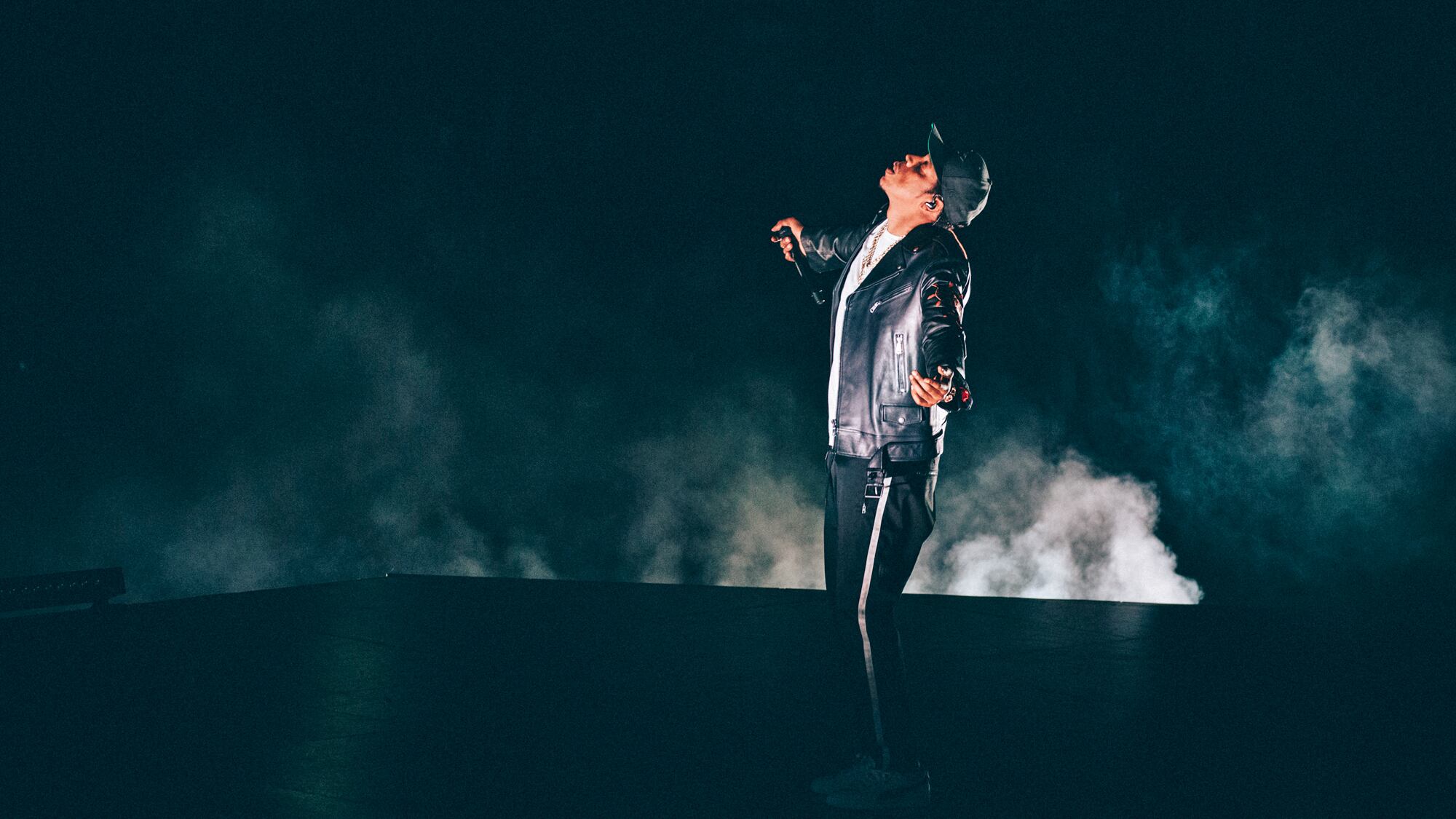Jay-Z killed himself to live.
At Moda Center on Thursday night, the 48-year-old rap monolith opened his set with a video of his face burning in effigy, an extension of the self-excoriation that frames this year's 4:44, the album he is ostensibly touring on. The show that followed was hardly funereal, but it did feel a bit like a resurrection—or at least a reminder, of who he is, what he's accomplished and what he's still capable of.
You wouldn't think a refresher would be necessary at this point. He's one of music's most towering figures, and if he'll never control the zeitgeist again, his legacy is ironclad. But hip-hop is very much a "what have you done for me lately" culture, and lately, the Jigga Man's teflon image has incurred some dents. His previous album, 2013's Magna Carta Holy Grail, suggested he'd lost the thread of his own rags-to-riches narrative, and the artistic airing-out at the hands of his wife painted him as both a heel and a fool.
But getting figuratively bludgeoned with a baseball bat—and literally assaulted by his sister-in-law—is apparently just the shot upside the head he needed. 4:44 isn't precisely an album-length apology for his indiscretions, but it is an album of deep emotional reckoning, where one of rap's greatest braggarts looks in the mirror and literally says, "Fuck Jay-Z." So far, it's brought critics (and Grammy voters) back on board faster than fans—tickets have moved slowly for this tour, and whole sections of the Moda's upper level were tarped off—but the creative rejuvenation makes this current tour feel like a comeback, even if, in truth, he never really went anywhere.
If the latest record is the product of a newer, more vulnerable Jay-Z, though, that wasn't exactly who showed up in Portland. "Effortless swag" is still his calling card. Dressed most of the night in a hoodie and sweatpants, he circumnavigated his octagonal stage, knocking out hit after hit with leisurely precision. He started with "Kill Jay-Z," the first track on 4:44, and by the time he reached "D'Evils," from his exalted debut, Reasonable Doubt, four songs later, he'd traveled back across two decades. Other stadium-sized rappers simply don't have the catalog to pull that off, and he did it with the casual ease (and appearance) of a dude on a morning stroll to the corner bodega.
With the in-the-round staging bringing him within spitting distance of the floor seats, it was about as up-close-and-personal as you could hope to get with someone of his stature. But in such a cavernous setting, the intimate new material still struggled to connect. He introduced 4:44's title track, a direct expression of contrition for his infidelity, as "the most uncomfortable song he's ever written," but performed on a retractable platform that placed him high above the audience, the nuance got swallowed up in the spectacle. Songs like that, the conversational "The Story of O.J." and the foggy cultural critique "Moonlight" were begging to be strung together into their own section of the set rather than getting dropped between the bangers—he really should consider a stripped-back theater tour, where he could dig into the pathos of those songs and place them in their proper context.
But if the venue felt too big to support the quieter moments, when it came to those old bangers, it barely seemed big enough. "99 Problems" is still a better arena-rock song than any actual rock band has mustered in a decade. (Of course, there's now some irony in hearing him gloat about his lack of girl problems while on his Sorry For Cheating On Beyoncé Apology Tour.) "Niggas In Paris" knocked so hard it even seemed to catch Jay by surprise—he had his band run back the intro so he could remove his jacket and get properly hype.
In all, he played more than 30 songs, and still didn't include everything he could have. (There was no encore, but he did end with the Linkin Park mashup version of "Encore," to which he attached a dedication to late frontman Chester Bennington.) It was a testament not just to the breadth of his career but the rare position he now holds. With hip-hop transitioning into middle-age, he's survived in the game long enough to become the first true "legacy rapper," an artist whose history transcends rap's recency bias and outweighs whatever future successes and failures might come his way. Simply put, there's no one else on his level. And while we might forget that sometimes, he'll surely keep coming back to remind us.
All photos by Sam Gehrke.
0 of 14















